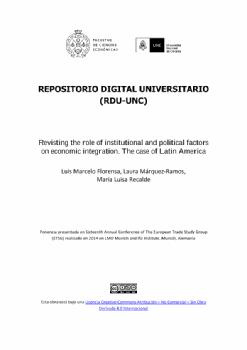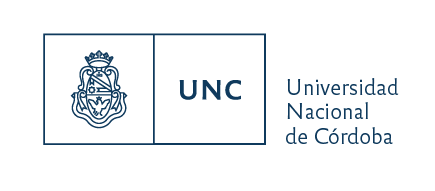| dc.contributor.author | Florensa, Luis Marcelo | |
| dc.contributor.author | Márquez-Ramos, Laura | |
| dc.contributor.author | Recalde, María Luisa | |
| dc.date.accessioned | 2022-07-31T19:49:32Z | |
| dc.date.available | 2022-07-31T19:49:32Z | |
| dc.date.issued | 2014-09 | |
| dc.identifier.uri | http://hdl.handle.net/11086/27720 | |
| dc.description.abstract | The recent conflict in Ukraine among pro-European integration groups and opponents, has increased the interest on the analysis on the determinants of regional integration. In fact, the events that are currently taking place in Europe point towards the importance that institutional and political factors play on integration processes. From a discrete choice framework, their relevance was already proven by Márquez-Ramos et al (2011), with a specific focus on the European integration dynamics. However, the related literature has not focused on the importance that these factors might also have in Latin America, where there is an increasing heterogeneity among countries. Particularly, two integration axis can be distinguished: the Pacific axis presents a continuity strategy, while the Atlantic axis presents an alternative strategy for regional integration. By focusing on both a cross-sectional and a panel data analysis for the Latin American integration process, we prove that institutional and political factors do matter. Furthermore, the role of these factors have been strengthened at the beginning of the present century due two main issues: the 11S and the “Revolución Bolivariana”. Finally, our analysis also confirms that geographic, economic and trade policy aspects are key elements for the formation and enhancement of economic integration agreements in which Latin American countries are involved. | es |
| dc.description.uri | https://www.etsg.org/ETSG2014/ETSG2014%20Programme.htm | |
| dc.format.medium | Electrónico y/o Digital | |
| dc.language.iso | eng | es |
| dc.rights | Licencia Creative Commons Atribución – No Comercial – Sin Obra Derivada 4.0 Internacional | * |
| dc.rights.uri | http://creativecommons.org/licenses/by-nc-nd/4.0/ | * |
| dc.subject | Regionalism | es |
| dc.subject | Latin America | es |
| dc.subject | Institutional and political factors | es |
| dc.subject | Cross section | es |
| dc.subject | Panel data | es |
| dc.title | Revisting the role of institutional and political factors on economic integration. The case of Latin America | es |
| dc.type | conferenceObject | es |
| dc.description.fil | Fil: Florensa, Luis Marcelo. Universidad Nacional de Córdoba. Facultad de Ciencias Económicas. Instituto de Economía y Finanzas; Argentina. | es |
| dc.description.fil | Fil: Márquez-Ramos, Laura. Universitat Jaume I. Departamento de Economía; España. | es |
| dc.description.fil | Fil: Recalde, María Luisa. Universidad Nacional de Córdoba. Facultad de Ciencias Económicas. Instituto de Economía y Finanzas; Argentina. | es |
| dc.description.field | Economía, Econometría | |
| dc.conference.city | Munich | |
| dc.conference.country | Alemania | |
| dc.conference.editorial | LMU Munich y Ifo Institute | |
| dc.conference.event | ETSG 2014 Munich - Sixteenth Annual Conference | |
| dc.conference.eventcity | Munich | |
| dc.conference.eventcountry | Alemania | |
| dc.conference.eventdate | 2014-9 | |
| dc.conference.institution | Ifo Institute, LMU Munich, CESifo | |
| dc.conference.journal | European Trade Study Group 2014 Munich | |
| dc.conference.publication | Revista | |
| dc.conference.work | Artículo Completo | |
| dc.conference.type | Congreso | |





